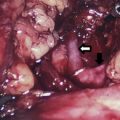
Thyroid cancer is the most common neoplasm treated by endocrine surgeons. Major changes in the molecular genetics available by commercial laboratories in the past three years have very defined likelihood of malignancy in previous lesions with indeterminate cytology. Management of lymph nodes as well as new aspects of postoperative treatment is presented as well. Controversial areas in the treatment of hyperparathyroidism include when to operate, how to use intraoperative parathyroid hormone (PTH) measurements, and what operation to perform, and all of these are described by leaders in the field. There have been several advances in the molecular genetics of pheochromocytomas and paragangliomas that affect both diagnosis and treatment. The operative approach for benign and malignant disease is discussed. Gut and pancreas neuroendocrine tumors reflect a disease that is increasing markedly in incidence in the United States, and the diagnosis, imaging, and surgical treatment are addressed.
This issue of Surgical Oncology Clinics of North America covers a wide range of topics that represent the most important advances in the field of endocrine surgery over the past ten years for surgery of the thyroid, parathyroid, adrenal, and pancreas or gastrointestinal neuroendocrine tumors.
Stay updated, free articles. Join our Telegram channel

Full access? Get Clinical Tree





